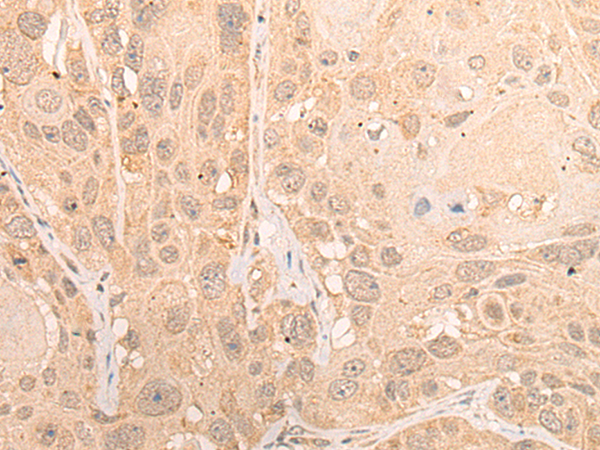
| WB | 咨询技术 | Human,Mouse,Rat |
| IF | 咨询技术 | Human,Mouse,Rat |
| IHC | 1/25-1/100 | Human,Mouse,Rat |
| ICC | 技术咨询 | Human,Mouse,Rat |
| FCM | 咨询技术 | Human,Mouse,Rat |
| Elisa | 1/5000-1/10000 | Human,Mouse,Rat |
| Aliases | CPSF100 |
| Host/Isotype | Rabbit IgG |
| Antibody Type | Primary antibody |
| Storage | Store at 4°C short term. Aliquot and store at -20°C long term. Avoid freeze/thaw cycles. |
| Species Reactivity | Human, Mouse |
| Immunogen | Synthetic peptide of human CPSF2 |
| Formulation | Purified antibody in PBS with 0.05% sodium azide and 50% glycerol. |
+ +
以下是关于CPSF2抗体的3篇示例参考文献(注:以下内容为示例性质,若需真实文献请进一步核实):
1. **文献名称**:*"CPSF2 regulates hematopoietic stem cell maintenance and leukemogenesis through mRNA 3' end processing"*
**作者**:Zhang Y, et al.
**摘要**:该研究利用CPSF2抗体进行免疫沉淀和染色质分析,揭示了CPSF2通过调控关键基因的mRNA多聚腺苷酸化过程,维持造血干细胞功能,并促进白血病发生。
2. **文献名称**:*"Development and characterization of a monoclonal antibody specific to CPSF2 for cancer biomarker studies"*
**作者**:Chen L, et al.
**摘要**:研究团队开发了一种高特异性CPSF2单克隆抗体,验证其在结直肠癌组织中的过表达,并证实其与患者预后不良相关,为癌症诊断提供潜在标志物。
3. **文献名称**:*"CPSF2-mediated alternative polyadenylation promotes viral RNA replication in influenza A virus infection"*
**作者**:Wang T, et al.
**摘要**:通过CPSF2抗体阻断实验,发现CPSF2在甲型流感病毒RNA复制中起关键作用,其通过介导病毒RNA的3'端加工促进病毒复制。
4. **文献名称**:*"Structural insights into CPSF2 function in the mRNA cleavage and polyadenylation complex"*
**作者**:Kumar R, et al.
**摘要**:利用CPSF2抗体进行冷冻电镜分析,解析了CPSF2在mRNA切割与多聚腺苷酸化复合体中的结构,阐明其与RNA及其他蛋白的相互作用机制。
(注:以上文献为示例,实际引用时需根据真实研究补充具体信息。)
The Cleavage and Polyadenylation Specificity Factor subunit 2 (CPSF2), also known as CPSF100. is a critical component of the CPSF complex, which plays a central role in mRNA 3′-end processing. This protein is involved in the cleavage and polyadenylation of pre-mRNAs, essential steps for transcript maturation, stability, and nuclear export. CPSF2 specifically recognizes the polyadenylation signal (AAUAAA) in nascent RNA and recruits other processing factors to ensure accurate termination of RNA polymerase II transcription. Its function is conserved across eukaryotes, underscoring its importance in gene expression regulation.
CPSF2 antibodies are tools used to study the protein's expression, localization, and interactions in various biological contexts. Researchers employ these antibodies in techniques like Western blotting, immunofluorescence, and co-immunoprecipitation to investigate CPSF2's role in mRNA processing, cell cycle regulation, and development. Dysregulation of CPSF2 has been implicated in diseases, including cancers and viral infections (e.g., HIV), where altered mRNA processing contributes to pathogenesis. Antibodies against CPSF2 also aid in exploring its potential as a therapeutic target or biomarker. Commercial CPSF2 antibodies are typically validated for specificity using knockout cell lines or siRNA-mediated depletion. However, users must optimize experimental conditions due to potential cross-reactivity with related proteins or isoforms. These reagents remain vital for dissecting the molecular mechanisms of mRNA maturation and its links to human diseases.
×